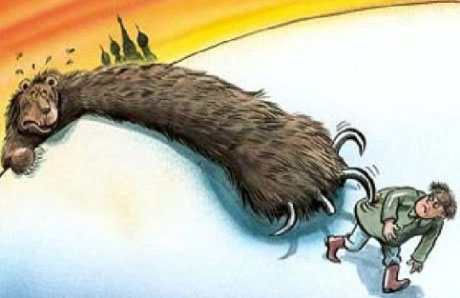What is Eurasianism in itself?
The fact that Karabakh issue has been raised at the time of the creation of the Eurasian Union, of course, has its today’s, topical “tactical” reasons. But it is very likely that the background of it is the peculiarity of the Eurasian ideology, about which, it seems, no one is talking.
As an economic unit, Eurasian Union, of course, will operate extremely inefficiently. The economic efficiency, both on national and international level, requires transparency. When in three founding and two candidate countries, the economy is runs by the “black horseshoe” and “taiga laws” dominate, the corruption is thriving, and under the lack of mutual accurate information, cooperation will not be successful. As within our countries, the Customs and Eurasian Unions will operate not by written but unwritten laws.
The Eurasian ideology is quite different thing. It has originated in the 1920’s under the Russian emigration in Europe from anti-liberal, nationalistic, and anti-Semitic elements. In the last 3-4 years, Russian President Vladimir Putin has repeatedly, directly or indirectly, referred to this ideology, which, in fact, is quite consistent with the views of nationalistic populists collecting power in the same Europe.
Read also
The roots of Eurasianism in Russia are in Slavonic worshiping popular in the 19th century. Certainly, there are rational ideas in this direction. For instances, there is no civilization highway, in which one leads and the other follows, and, therefore, the latter should definitely try to fetch up with the ones going ahead. According to this ideology, the development of civilization is not a highway, but a field, in which humanity must experience all the roads. It is clear that the extremized application of the concept will logically result in isolation (isolationism), and opposing the whole world.
However, along with the sound health, Eurasianism has such lines, on which we, Armenians, should pay attention. Unlike Slavonic worshipers, Eurasianists believe that the culture of Turanian people, historically associated with Russians, is much close to them, the Russians, than of the western Slavonic people, Czechs and and Poles. Russian philosopher Nikolai Berdyaev writes in this respect, “Eurasians like Turanic elements in Russian culture. Sometimes it seems that Asian, Western, Tartarian, and the Mongol elements in Russian culture are closer to them than of Russian. Apparently, they prefer Genghis Khan to St. Vladimir. Moscow Kingdom for them is a baptized Tatar kingdom, and the Tsar of Moscow is an Orthodox-converted Tatar Khan.”
After all of this, whether it is accidental that the driving force of still to be established Eurasian Union is Turkey’s and Azerbaijan’s ally, Kazakhstan. And in the context, whether it is possible for this Union be amicably disposed towards Armenia and Artsakh.
In the end, one more quote from Nikolai Berdyaev, “Eurasianism is first of all an emotional, not intellectual direction, and this emotionality is the response of creative national and religious instincts to the occurred catastrophe (the October Revolution- A. A.). This kind of spiritual formation can lead to Russian fascism.”
ARAM ABRAHAMYAN






















































